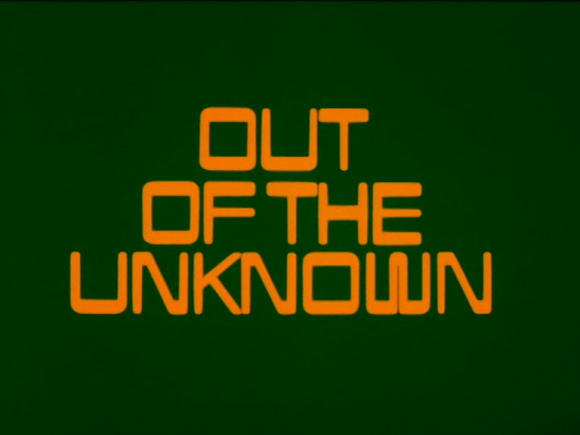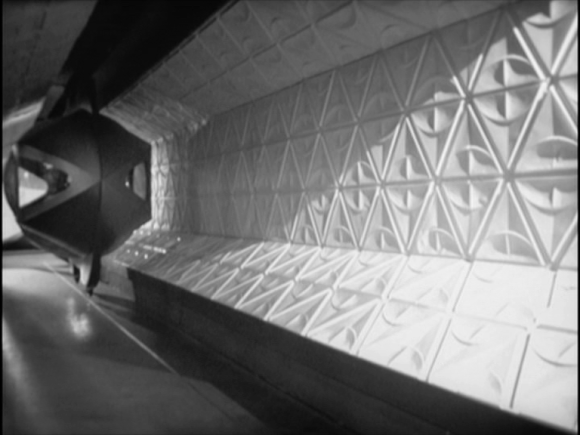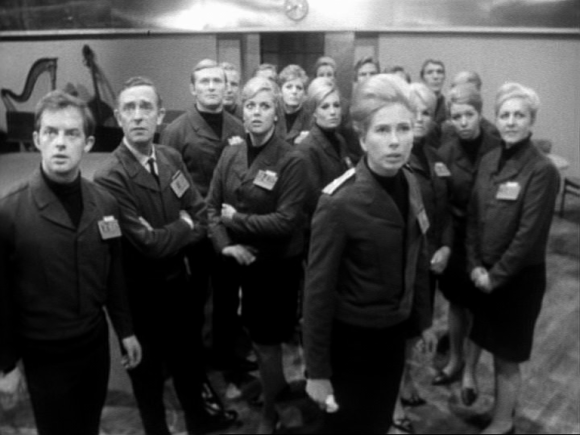 The science fiction single play anthology series Out of the Unknown (BBC2, 1965-71) has long been something of a holy grail DVD release for cult TV enthusiasts.
The science fiction single play anthology series Out of the Unknown (BBC2, 1965-71) has long been something of a holy grail DVD release for cult TV enthusiasts.
With twenty plays surviving (plus fragments of others), some of them literary adaptations requiring tricky rights to release, being able to possess the complete programme in one package is – for those of us who first became aware of the programme through reading articles in Time Screen magazine back in the 1980s – a happy state of affairs that would have seemed a fantastical situation in itself.
The exceptional quality of the set, and the love and care that have gone into making it, creates a sense of goodwill on the part of the viewer that the actual plays themselves often test. All anthology series are by their nature erratic, but producer Irene Shubik’s determination (under the encouragement of pioneering 1960s BBC Head of Drama Sydney Newman) to create uncompromising ‘hard’ SF, in the most part from literature (rather than created for the screen) makes for quite tough viewing (especially in the first series, with 60 minute stories), even when the viewer is familiar with 1960s television drama conventions. While watching Out of the Unknown I was often reminded of Kingsley Amis’s instruction (in New Maps of Hell) that in science fiction, specialisation of character becomes a dramatic weakness:
Science fiction shows us human beings in their relations not with one another, but with a thing, a monster, an alien, a plague, or a form of society, and while it is true that society is a human thing, the aspects of it which engage these writers can be validly treated as impersonal. (1960: 128)
Out of the Unknown stories are often remarkably bleak, especially in their conclusions, which often show trapped characters marooned on dying worlds without palliative suggestions of escape. Surviving stories from the final 1971 series are horses of a different colour, as much supernatural tales in the Dead of Night (BBC, 1972) mode as science fiction, and perhaps more easily assimilated by many contemporary viewers.

Where the series scores is in the imagination and awe that it brings to the world building of its fantastical and dystopian futures, helped by the free reign given to BBC design and the Radiophonic Workshop in the 1960s. Two examples are particularly memorable; Philip Saville’s direction of E.M. Forster’s ‘The Machine Stops’ (6 October 1966) creates a disconnected world of corridors and capsules that anticipates Kubrick’s 2001 (1968), while Mordecai Roshwald’s terrifying H-bomb parable ‘Level Seven’ (27 October 1966) demonstrates Rudolph Cartier’s extraordinary understanding of space and regimented crowds, more famously seen in Nineteen Eighty Four (BBC, 1954).

Remarkably, considering the age of the material and the limited funds available for DVD production, eleven plays have commentaries, convened by Toby Hadoke, a familiar name to viewers of the BBC’s Doctor Who range. The tone varies considerably from commentary to commentary, sensitively calibrated to the different levels of recall that participants are capable of and their geographical location (a few conversations come via Skype). I found the contributions of directors particularly insightful, especially John Gorrie (‘The Dead Past’, 25 October 1965), Philip Saville (‘The Machine Stops’) and Roger Jenkins (‘Some Lapse of Time’, 6 December 1965), all three of whom retain their acute sense of what was practicable and what worked dramatically under the conditions of production. Hadoke’s frequent citation of arcane bits of specialist knowledge is a technique that has some critics, but I’ve always found it endearing and diverting, and he always works well at putting elderly actors at ease. A good case in point is the commentary with veteran John Carson (‘This Body is Mine’, 5 May 1971), who has next to no recollection of the episode, but gives a beguiling overview of a full career instead.
In addition to the commentaries, the set also includes a booklet with several valuable essays by Mark Ward (author of the Kaleidoscope Out of the Unknown guide) setting out a different aspect of the show’s production background and contemporary context, reconstructions of the four episodes where soundtracks survive (which make sense when you watch them), the twenty surviving minutes of ‘The Little Black Bag’ (25 February 1969) with (much-appreciated) restored colour, a forty minute documentary that rounds up the remaining extant clips from otherwise missing episodes and includes contributions from a diverse range of makers of the programme, and (easy to overlook, but particularly appreciated) hundreds of stills that give the viewer a real sense of the design and feel of the plays that don’t survive.
Although many of the plays themselves are often quite demanding viewing, the Out of the Unknown anthology represents the gold standard of DVD releases for TV drama, bringing a wealth of relevant background context and exacting research to a central BBC production. It is an essential purchase for all scholars with an interest in the history and development of British television drama.
BIBLIOGRAPHY
Amis, Kingsley, New Maps of Hell. London: Victor Gollancz (1960).
Ward, Mark, Out of the Unknown: A Guide to the legendary BBC series. Dudley: Kaleidoscope Publishing (2004).
(DVD review first published in Viewfinder Issue 99, June 2015)